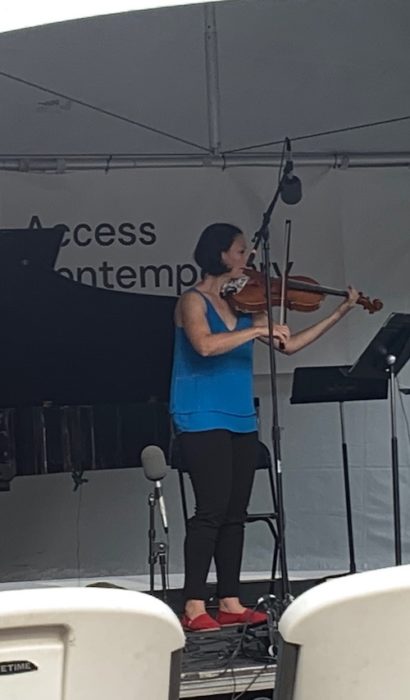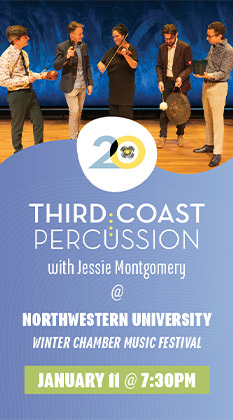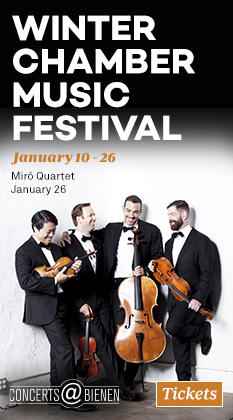Tech issues apart, Thirsty Ears Festival serves up a wide range of music in relaxed, al fresco setting

Access Contemporary Music kicked off its seventh annual Thirsty Ears Festival Saturday, the city’s only classical music street festival. Wilson Street between Hermitage and Ravenswood was cordoned off for the weekend festival, which features seventeen musical acts on the main stage as well as a host of food trucks, vendors, kids’ activities, and a Dovetail Brewery tent.
Unlike Chicago’s other outdoor classical music festivals, Thirsty Ears’ laid-back, block-party atmosphere encourages concertgoers to chat as they sip their beers, face-painted kids to chase each other through the seats with popsicles in hand, and attendees to float in and out of the sets. The encouragingly large number of people in attendance Saturday afternoon—including many families with young children—is a testament to the success of this model.
Like any outdoor music festival, the music sometimes became a bit secondary to the other distractions. With the festival taking place on a quaint residential street in Ravenswood, one would expect it to be relatively quiet. Unfortunately, the constant stream of planes overhead and the roar of the Metra train to the east were frequent distractions.
Consequently, it was often difficult to hear the performers, and details and nuance were easily lost, even with sound amplification. This posed more of a problem in some sets than in others, depending on the instrumentation, the piece, and the performers.
Taking the stage at 4 o’clock was the Wurtz–Berger Duo, composed of pianist-composer Amy Wurtz and cellist Alyson Berger. Unfortunately, issues with the sound system delayed their set by fifteen minutes. Even then, there was still occasional feedback noise, the balance was not great between the players, and it was difficult to hear details or nuance unless you were in the first three rows. Plus, even though the piano was a baby grand, the miking had the effect of making it sound like a tinny electronic keyboard.
Nevertheless, the duo carried on with the utmost professionalism with an expressive rendition of Debussy’s Cello Sonata. Employing a similar musical language to the Debussy, Seth Boustead’s Hot Streak made for a smooth transition. (Boustead is the executive director of Access Contemporary Music and the coordinator of this festival.) Beethoven’s Cello Sonata No. 4 also made an appearance, which was the easiest piece of the set to latch onto amid the sonic distractions.
Where the stage setup let the duo down the most was in Jane O’Leary’s Only Gestures Remain. The most esoteric contemporary piece on the program, the work was full of percussive effects and extended techniques; not united by any traditional melodic, harmonic, or rhythmic thread, it was difficult to follow in a casual outdoor setting. O’Leary’s piece proved there is a fine line between challenging people and alienating them, though the piece may come off better in an an indoor chamber venue than an outdoor festival.
Violist Rose Wollman also explored where that line is in her solo program based on Ligeti’s Viola Sonata. In her program, she selected four movements from the challenging sonata—Loop, Facsar, Lamento, and Chaconne Chromatique—and paired each of them with two related pieces to form what Wollman called “triptychs.” By beginning each triptych with a baroque selection, Wollman intended to demonstrate how Ligeti was inspired by baroque forms and gestures. A thematically related contemporary piece, including one of her own, capped off each set.
Though the thematic links between the Ligeti movements and the other selections were not always entirely apparent, Wollman’s program was an innovative way to contextualize Ligeti’s sonata and make it more digestible. The baroque pieces, especially the Passacaglia movement from a Heinrich Ignaz Franz Biber’s sonata, were stylishly played palate cleaners, and Wollman’s own piece, Wanderlust, based on the same ground bass as Pachelbel’s Canon in D, was a standout among the contemporary selections. The Ligeti movements did, however, seem to make the audience a bit restless.
The Black Oak Ensemble, composed of violinist Desirée Ruhstrat, violist Aurélien Fort Pederzoli, and cellist David Cunliffe, took a more people-pleasing approach to their programming. Beginning with a selection from Bach’s Goldberg Variations, the Black Oak Ensemble immediately demonstrated their musical assuredness and comfort in playing with each other. They flowed as one unit and managed to be fully expressive and create moments of intimacy, even with the limitations of the sound system.
A series of pieces by lesser-known, early-twentieth-century French composers followed—taken from the group’s recent Cedille recording—including a delightful trio by Henri Tomasi. Pederzoli’s solo in the nocturne movement was clear and finessed, and the rustic peasant dance of the third movement featured a luscious violin solo from Ruhstrat. A quirky tongue-in-cheek divertissement by Gustave Samazeuilh and a boisterous finale by Jean Cras that Pederzoli likened to music from The Pirates of the Caribbean were also featured. Though these pieces were all obscure and often intricately textured, the trio’s engaging and committed performance made for appealing performances.
In the ensemble’s only contemporary selection, two movements from Chicago-based composer Marc Mellits’ Tapas concluded their set. These, too, were crowd pleasers in their post-minimalist style. The Black Oak Ensemble seemed to have found the sweet spot in their program of what kinds of contemporary classical music—and classical music in general—work in such an environment.
The Thirsty Ears Festival continues 2–9 p.m. Sunday. Suggested donation is $10. acmusic.org
Posted in Uncategorized


